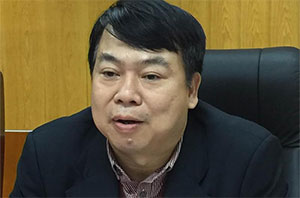State Capital Investment Corporation currently holds stakes in 146 businesses. Its chairman Nguyen Duc Chi shares with VIR the company (SCIC)’s major tasks set for 2017.

As of now, state capital still represents 92 per cent of the total capital at state-owned enterprises (SOEs) which are to be soon equitised, due to divestment obstacles. How did SCIC fare with the task in 2016?
The financial market, as well as the international and regional stock markets were highly volatile in 2016, particularly in the later months during the US presidential election. Real estate tycoon Donald Trump becoming the new US President has cast major impacts on the global financial market—and Vietnam was not an exception.
Notwithstanding, last year we (SCIC) successfully divested from 73 SOEs, at 37 of which we had to stage auctions several times due to failed efforts.
In a nutshell, we sold VND3.038 trillion ($138 million) in state capital last year, regaining the state VND16.1 trillion ($732 million), more than five-fold the initial value.
Can this outcome largely be attributed to the auction of Vietnam’s leading dairy producer Vinamilk?
That is undeniable. Particularly, on December 12, 2016, SCIC succeeded in selling a 5.4 per cent stake in Vinamilk for VND11.2 trillion ($513 million), 28 times higher than the initial value.
If this transaction is not included, during 2011-2015, we sold state capital in more than 410 businesses, taking back VND8.7 trillion ($396 million), 2.4-fold the book value, while many other SOEs brought the state proceeds only 1.2-1.3 times higher than their book value.
What were the most valuable lessons from state capital divestiture, particularly from SOEs facing hardships in production and business activities?
Under current regulations, selling state capital at businesses must follow two options: either selling the whole batch or dividing the stake into small portions to sell. Selecting the mode to pursue must suit actual market conditions and adhere to market rules.
In some cases, we asked businesses to debut on the stock market before holding auctions. In other cases, we ordered firms to first engage in restructuring to improve performance, then holding auctions to bolster the efficiency of stake sales.
For instance, if we decided on selling the state capital at An Giang Agriculture and Foods Import Export Co. last year, we would definitely incur losses because the company is on the verge of going bankrupt.
Therefore, instead of divesting at any cost, we decided to focus on comprehensively restructuring the company. Consequently, the company broke even by the end of 2016.
Leveraging this outcome, the company will solidify development during this year, making it easier to sell the state’s capital part at a higher value.
In another case, Sa Giang Import Export Corporation was a profit-making business with products exported to the US.
In fact, the company’s development has supposedly come to saturation and under market rules, without finding new directions the company may enter a down in its development cycle. In this context, we asked the company’s management to outline a new development strategy for the next five to ten years which will help make the company more appealing to investors when SCIC decides to withdraw from Sa Giang.
What is SCIC’s state capital divestment plan in 2017?
Selling state capital is an art which needs to be flexible depending on each case and particular market conditions to avoid causing losses to the state coffers.
Currently, SCIC has stakes surpassing VND18.8 trillion ($855 million) in book value in 146 SOEs. Therefore, one of our core tasks this year will be to sell.
To facilitate the process, SCIC has requested all businesses which satisfy listing conditions to shortly debut on the stock market. In doing so, firms will need to make public all information under stock market regulations. This helps us to clarify the stake value we will put on sale and prevent subjective assessments.
VIR